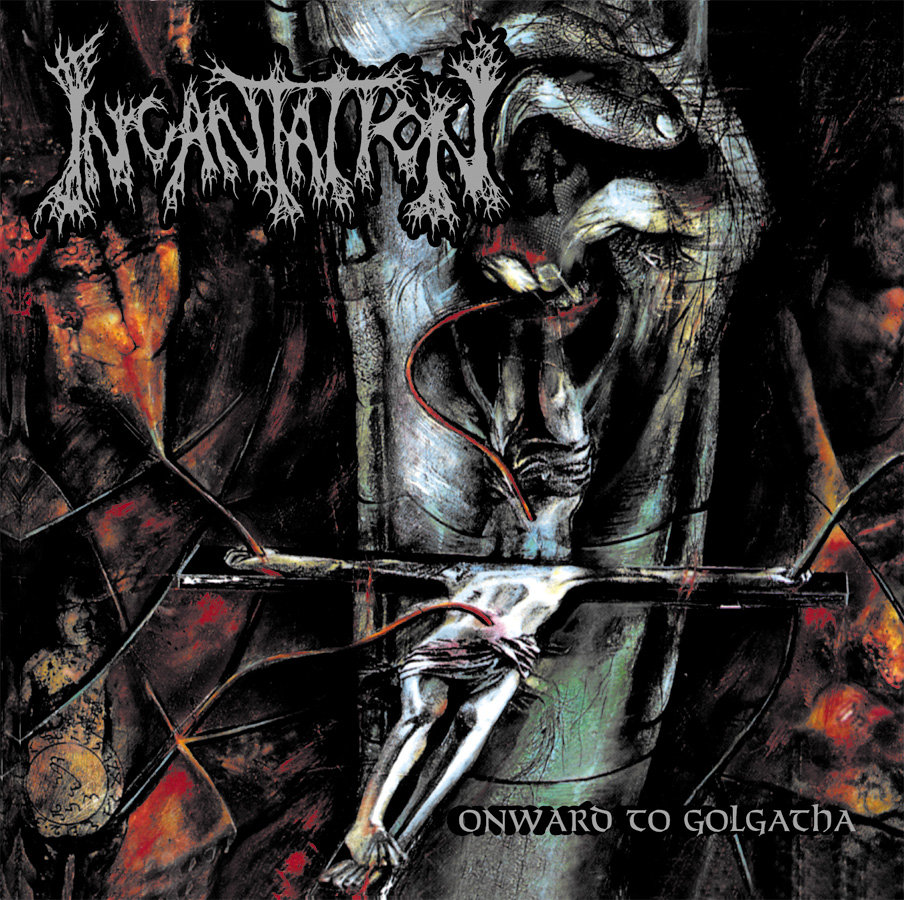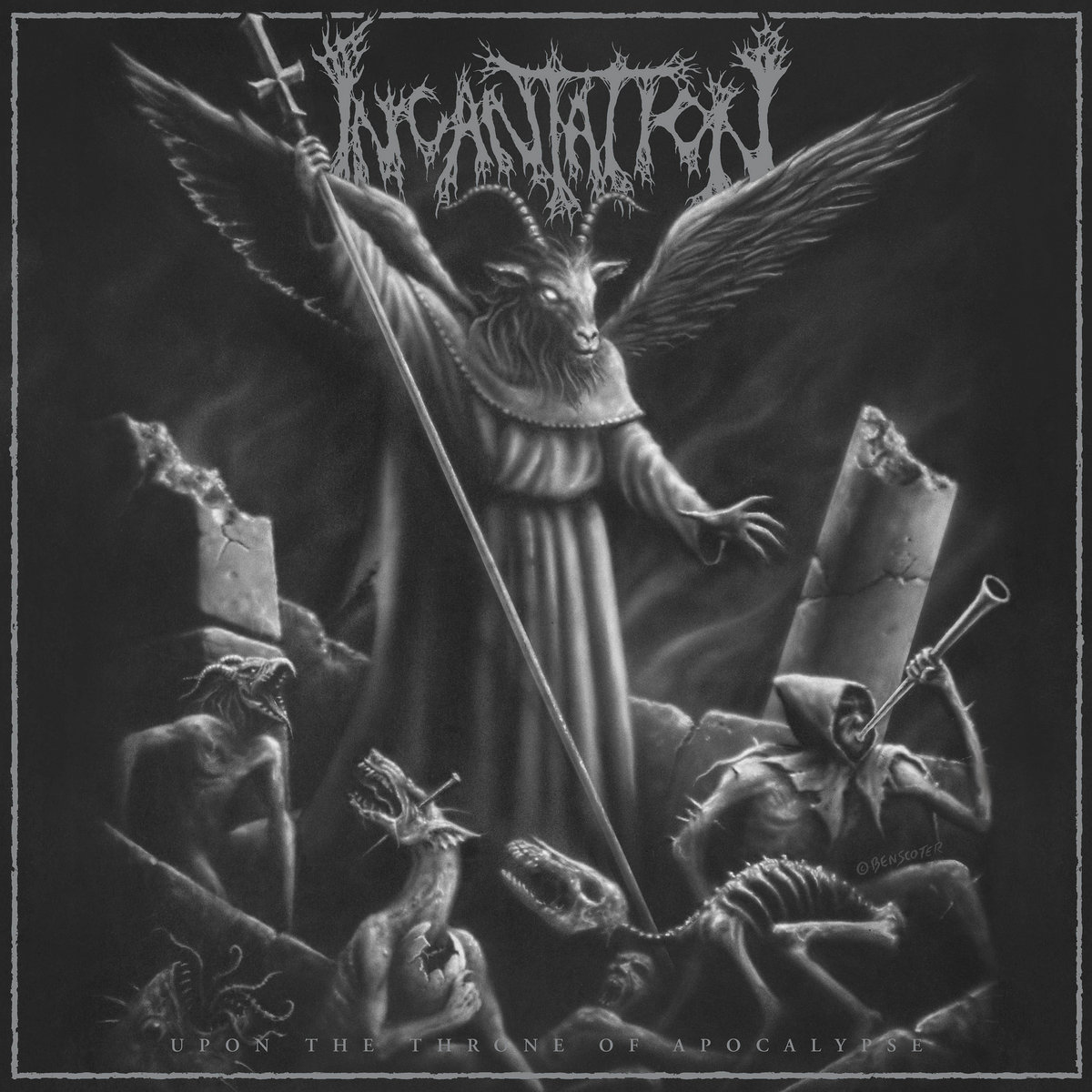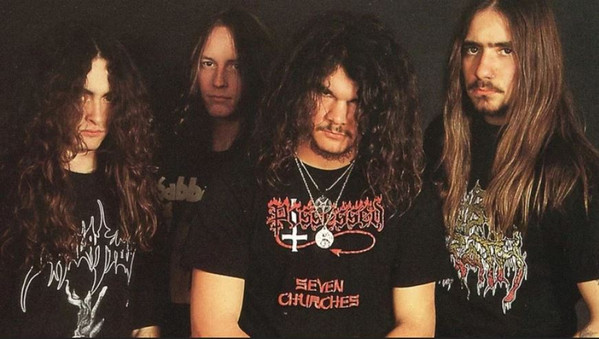Incantation’s Holy Trinity of Death Doom Blasphemy
Few bands have so thoroughly mapped the topography of Hell as Incantation. Emerging from the early ‘90s American Death Metal crucible, they offered not a celebration of carnage but a sermon in suffering. Where others raced to the blastbeat finish line, Incantation waded through sulphur and shadow, dragging the genre into the cryptic recesses of doom. Their early trilogy — “Onward to Golgotha” (1992), “Mortal Throne of Nazarene” (1994), and the posthumous twin of the latter, “Upon the Throne of Apocalypse” (1995) — remains one of the most impenetrably blasphemous offerings in Metal’s blackened liturgy.
These were not merely records; they were sonic reliquaries of decay and inversion, twisted echoes of divine architecture where every reverb-drenched riff seemed to recoil from the light. Incantation’s sound did not seek to entertain — it sought to drown. And in that suffocation lay a strange ecstasy, a ritualistic abandonment of flesh and form in favour of the abyssal unknown.
“Onward to Golgotha” - The Baptism of Decay
“Onward to Golgotha”, Incantation’s full-length debut, is less an album than a mausoleum — a cavernous construct of crumbling stone and bone dust. Released in 1992 via Relapse Records, it emerged at a moment when Death Metal was cresting: Morbid Angel had already torn through the heavens, Obituary had sketched the blueprint of decay, and Suffocation were conjuring brutalist nightmares. Yet Incantation walked a different path — one not of speed but of solemn damnation.
Everything about “Onward to Golgotha” feels subterranean. John McEntee’s guitar tone is a sodden wall of distortion, buried beneath thick layers of production grit. Craig Pillard’s vocals — often mistaken for demonic guttural incantations — rise like miasma from a crypt, intelligible only in their overwhelming contempt for life. The drums alternate between ritualistic dirges and brief convulsions of blastbeat mania, lending the record a diseased pulse.
Tracks like “Golgotha” and “Devoured Death” capture the band’s essence: suffocatingly slow riffs give way to flurries of chaos, only to collapse once again into grim, lurching tempos. These aren’t songs so much as funeral processions, each step dragging the listener deeper into a realm where traditional song structure is sacrificed on the altar of pure atmosphere.
What “Onward to Golgotha” achieved was not technical supremacy or innovation, but spiritual ruin. It introduced a theology of rot into Death Metal — a rejection not just of God, but of flesh, hope, and linearity. In its sepulchral ambiance, one finds the true beginning of Death-doom’s most unholy strain.
“Mortal Throne of Nazarene” - The Desecration Complete
If “Onward to Golgotha” was a tomb, then “Mortal Throne of Nazarene” is the desecration of the temple above it. Released in 1994, after considerable internal turmoil, the album finds Incantation sharpening their heretical vision into something more pointed, though no less overwhelming. The guitars are marginally clearer, the drums more direct, but the violence is even more sacrilegious.
Here, Incantation elevates their contempt into a form of sonic iconoclasm. The album’s very title is a spit in the face of Christian cosmology — not merely a blasphemous metaphor but a literal inversion of Christ’s exaltation. Songs like “Emaciated Holy Figure” and “Blasphemous Cremation” are almost liturgical in their structure, unfolding in slow, choking passages that resemble inverted hymns.
Dan Kamp’s drumming is thunderous yet ceremonial, often allowing vast, echoing spaces to form between the riffs. It’s in these moments — particularly on tracks like “Abolishment of Immaculate Serenity” — that the band crafts a true sense of the unholy. The silence between notes feels as intentional as the notes themselves, a rare and unnerving quality in extreme Metal.
Despite being plagued by label disputes and internal disagreements, “Mortal Throne…” achieves something even darker than its predecessor. It is less raw, perhaps, but more doctrinal in its heresy — the sound of a band no longer just reacting to religion, but actively constructing an anti-faith, a sonic anti-church.
“Upon the Throne of Apocalypse” - The Alternate Gospel
Released in 1995, “Upon the Throne of Apocalypse” is not a sequel but a spectral echo, an alternate mix of “Mortal Throne of Nazarene”, reportedly closer to McEntee’s original vision before Relapse Records intervened. But to dismiss it as a mere “demo version” is to ignore its unique, almost ghostly presence in the Incantation canon.
Here, the production is more cavernous and unfiltered. The guitars are thicker, more oppressive, the vocals even more buried in reverb and mire. It sounds less like a recording than a transmission from a forgotten crypt, intercepted by accident. Every riff seems to bleed into the next like fog rolling across tombstones, and the drums pulse with a necrotic languor that makes even the more aggressive moments feel submerged in rot.
What makes Upon the Throne of Apocalypse remarkable is its sense of timelessness. Unlike Mortal Throne, which has moments of clarity and dynamic shape, this version is monolithic, a single heaving mass of Death. There are no concessions to pacing or structure. It is pure atmosphere, distilled and delivered without filter.
As such, it has become a cult artefact, revered not just as a variant, but as a statement in itself. It suggests that, for Incantation, form is always secondary to spirit, and the spirit here is nothing less than that of utter doctrinal collapse. The sound of altars overturned, and icons defaced, not with fury, but with grim inevitability.
Legacy of Unlight
Taken together, these three records form a triptych of sonic blasphemy, a heretical liturgy carved not in scripture but in decay. What Incantation offered was not merely extreme music, but a worldview, a liturgical system in which dissonance and dissolution became the only remaining truths. Their influence can be felt across the global underground: in the echoing tombs of Finnish Death-Doom, in the chaos of Portal and Grave Miasma, in the modern cult of cavern-core.
And yet, no band has quite
replicated their essence. For Incantation were never about riffs or speed or
aggression alone. They were about space, about atmosphere, about unknowing.
Their early work resists analysis precisely because it was never made for light.
It belongs to another realm, and it continues to summon listeners into its
crypt, one unholy procession at a time.





Comentários
Enviar um comentário